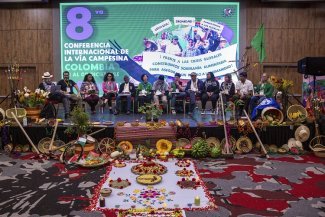Workers at Egypt’s Misr Spinning and Weaving Company were forced to end a two day strike on 8 February, due to the arrest of five female workers and threats not only to increase the number of arrests, but also to fire striking workers.
Around 3,000 textile workers at the el-Ghazl factory, which is located in the Egyptian industrial city of el-Mahalla el-Kubra, went on strike to demand the payment of benefits.
“We are entitled to a 600 Egyptian pounds (around US$ 33) development bonus [editor’s note: one of several bonuses paid to public sector workers to compensate for their low basic salary], but we are only getting EGP 360 (around US$ 19),” said a female worker at el-Ghazl who spoke to Equal Times on the condition of anonymity. “Some of our colleagues have won court orders to force the company to pay them the EGP 600, but they have not yet been implemented,” she explained.
Misr Spinning and Weaving Company is one of the biggest textile companies in Egypt. It employs over 20,000 workers in eight factories, and falls under the authority of the government-run Cotton and Textiles Holding Company.
Ever since the rule of Hosni Mubarak, Misr workers have played an important role in the labour movement in Egypt.
In December 2006, el-Ghazl workers went on strike, inspiring worker action across the country in response to low pay, the high cost of living and market reforms. And in April 2008, a strike at Misr Spinning and Weaving Company is widely considered as the precursor to the fall of President Mubarak in February 2011.
In 2013, the government introduced new laws restricting protests and strikes in Egypt, which has resulted in the imprisonment of thousands of people.
Since President Abdel Fattah al-Sisi took power in 2014, all forms of protest – including strikes – have been repressed. According to the Human Rights Watch World Report 2017, “Security forces routinely tortured detainees and forcibly disappeared hundreds of people during 2016.”
Still waiting for ‘Bread, Freedom and Social Justice’
Against this backdrop, the textile workers bravely continued with demands. In addition to the development bonus, they also called for a 10 per cent increase to their basic salaries and an increase of the nutrition allowance from EGP 3 daily to EGP 10, to compensate for soaring inflation rates and the huge rise in food prices.
The annual inflation rate for January 2017 amounted to 29.6 per cent, according to the official CAPMAS statistics agency, which is the highest rise in the consumer price index since November 1986.
Although ‘Bread, Freedom and Social Justice’ was the rallying cry of Egypt’s 2011 revolution, all three remain illusive. Prices have soared since Egypt devaluated its pound last November.
The value of the Egyptian pound has roughly halved and urban consumer price inflation has doubled from 13.6 percent last October.
“It is now extremely difficult to make ends meet. We hardly eat any meat, dairy, or fruits,” the el-Ghazl worker said. “Some of us are working two jobs, but we are still struggling to survive,” she added.
In response to Egypt’s deteriorating economic conditions, a number of trade unions, civil society organisations, political parties and political movements launched the “We Want to Live” campaign in December 2016.
According to the founding statement of the campaign it aims to “face the fierce and unprecedented attack on the living conditions of the toiling masses” by mobilising around the introduction of a decent wage for all workers, the rights of independent trade unions, pensions and social security and better healthcare provisions.
At a conference held in Cairo in January, the campaign also accused the government of President Sisi of “siding with top businessmen and using oppressive tactics against any labour movement, including putting [their members] on trial and banning independent unions.”
Latest attack
The repression facing workers at the Misr Spinning and Weaving Company is just the latest attack on workers’ rights in Egypt. In January, for example, 19 striking workers from the IFFCO oils and soap factory in Suez were arrested and charged with inciting a strike and halting production. The charges were later dropped.
In September 2016, leaders of the Cairo Bus Workers’ Union were arrested. Five members are currently appealing a two-year prison sentence and fines of EGP100,000 (approximately US$6200) related to a strike in 2014.
And in May 2016, workers at the Alexandria Shipyard Company were arrested and detained for demanding better pay and health and safety measures. Because the company is under the administration of the Ministry of Defence, the workers are currently being tried in a military court.
At Misr Spinning and Weaving Company, the company union did not support the strike, according to the female worker. “None of them [union reps] approached the striking workers to listen to their demands,” she said.
But a member of the company union, who also spoke to Equal Times on condition of anonymity, said this is because “the workers are not entitled to the things they are demanding. The 10 per cent raise has not been approved yet,” he said.
However, he did say that the unions had been doing work behind the scenes, including writing a letter to the company management, to urge them to find the resources to pay for the development bonuses. He said the union was particularly focused on finding a solution through negotiation because “things now are different –anyone who protests might be arrested.”
Atmosphere of fear
Public sector trade union leader Fatma Ramadan says that an atmosphere of fear has underpinned all recent industrial action. “Arrests, references to trial and dismissal are tools used now by the state apparatus to suppress workers’ protests without fulfilling their demands,” she told Equal Times. The government is being particular tough on workers and trade unions because of the impact strikes can have – particularly with the deteriorating economic conditions.
“Repression is how the government reacts to political, social, and economic demands. The lack of militant workers’ organisations makes it harder for workers to hold out, so recently most protests are defeated,” Ramadan added.
The 2016 murder of Giulio Regeni, an Italian student who had been conducting research into Egyptian street vendors, drew worldwide condemnation and is considered as yet more evidence of the extreme repression facing the labour movement in Egypt.
For Egypt’s independent trade unions, things need to change. “Conventional methods of resistance are not enough anymore. We need more creative and effective methods of resistance to rise amongst the workers facing state repression,” Ramadan concluded.









